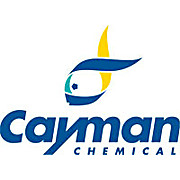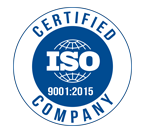Cayman Chemical, 1.0 mg
-
8-iso Prostaglandin F2ß
Cayman Chemical8-iso PGF2β is an isomer of PGF2α with a non-enzymatic, non-cyclooxygenase origin. It is one of 64 possible isomers of PGF2α which can be produced by free radical peroxidation of arachidonic acid. 8-iso PGF2β exhibits very weak contraction of human umbilical vein artery and…
-
Mps1-IN-2
Cayman ChemicalCAS Number: 1228817-38-6 Molecular Formula: C26H36N6O3 Formula Weight: 480.6
-
Cyclothiazide
Cayman ChemicalA benzothiadiazide that acts as a potentiator of AMPA receptors, positively modulating its response to glutamic acid (EC50 = 3.8 µM); also a negative modulator of GABAA receptors, reversibly inhibiting both evoked and spontaneous inhibitory postsynaptic currents (IC50 =…
-
5-trans Fluprostenol isopropyl ester
Cayman ChemicalTravoprost is the Alcon trade name for fluprostenol isopropyl ester, an F-series prostaglandin analog which has been approved for use as an ocular hypotensive drug. Fluprostenol isopropyl ester is a prodrug which is converted by esterase enzymatic activity in the cornea to yield the corresponding…
-
-
Cannabinol monomethyl ether
Cayman ChemicalA phytocannabinoid whose physiological and toxicological properties are not known
-
Cysmethynil
Cayman ChemicalAn indole-based, time-dependent inhibitor of Icmt (IC50 = i = 0.14 µM for the final complex); decreases mTOR signaling, accumulation of cells in the G1 phase, and autophagy-mediated cell death in PC3 prostate cancer cells.
-
SB-242084 (hydrochloride)
Cayman ChemicalAn antagonist of the 5-HT2C receptor (pKi = 9.0), with at least 100-fold more selectivity over other 5-HT, dopamine, or adrenergic receptors; brain penetrant with significant anxiolytic activity; used extensively in animal research.
-
ONO-8711
Cayman ChemicalA potent and selective competitive antagonist of the EP1 receptor (Ki = 0.6 and 1.7 nM for human and mouse EP1, respectively); effectively reduces tumor incidence and multiplicity in mouse models of colon, breast, and oral cancer; suppresses pain and acid-induced HCO3- secretion in the stomach.
-
Guanosine 5'-triphosphate (sodium salt hydrate)
Cayman ChemicalA substrate for the synthesis of RNA during the transcription process and the synthesis of DNA during DNA replication; participates in G-protein-related signal transduction where it is converted to GDP through the action of GTPases.
-
-
JNJ-10198409
Cayman ChemicalAn inhibitor of PDGF-BB tyrosine kinase with an IC50 value of 4.2 nM when tested in human coronary artery smooth muscle cells.
-
PDMP (hydrochloride)
Cayman ChemicalA ceramide analog that contains a mixture of all four possible stereoisomers.
-
Nevirapine
Cayman ChemicalA non-nucleoside reverse transcriptase inhibitor that binds to viral reverse transcriptase and blocks polymerase activity by preventing RNA plus-strand initiation (IC50s = ~ 0.45 to 0.9 μM).
-
NSC 405020
Cayman ChemicalFormal Name: 3,4-dichloro-N-(1-methylbutyl)-benzamide CAS Number: 7497-07-6 Molecular Formula: C12H15Cl2NO
-
BRD73954
Cayman ChemicalA small molecule inhibitor that potently and selectively inhibits both HDAC6 and HDAC8 (IC50s = 36 and 120 nM, respectively).
-
Galloflavin
Cayman ChemicalAn LDH inhibitor (Kis = 5.46 and 15.06 µM, for the A and B isoforms, respectively) that prevents proliferation of many different cancer cells by blocking glycolysis and ATP production.
-
1-Palmitoyl-2-oleoyl-3-linoleoyl-rac-glycerol
Cayman ChemicalPOL is a common triglyceride component in seed and vegetable oils including olive, sesame, soybean, canola, corn, hazelnut, and many others. POL is one of the standard triglyceride components used for the USP analysis of sesame oil for pharmaceutical applications.
-
Prostaglandin F2a ethyl amide
Cayman ChemicalPGF2α-NEt is an analog of PGF2α in which the C-1 carboxyl group has been modified to an N-ethyl amide. PG esters have been shown to have ocular hypotensive activity. PG N-ethyl amides were recently introduced as alternative prostaglandin ocular hypotensive prodrugs. Although it has been…
-
Isoxanthopterin
Cayman ChemicalA natural intermediate in the pteridine pathway that can be produced naturally from 7-oxobiopterin or in vitro by the oxidation of pterin by xanthine oxidase.
-
D-Mannoheptulose
Cayman ChemicalA heptose that inhibits glucokinases and hexokinases from diverse organisms through competition with D-glucose (Ki = 0.25 mM); blocks glucose oxidation and glucose-mediated insulin release from pancreatic islet cells.
-
-
U-46619
Cayman ChemicalTXA2 receptor agonist; causes platelet shape change (EC50 ~6 nM) and aggregation (EC50 ~97 nM).
-
4'-Aminomethyl-4,5',8-trimethylpsoralen
Cayman ChemicalA bifunctional photoreactive agent for crosslinking nucleic acids; intercalates into double-stranded regions in DNA or RNA and, upon UV irradiation, forms covalent adducts with pyrimidine bases; used to study different types of RNA from diverse organisms, including viruses.
-
Ochratoxin A
Cayman ChemicalA mycotoxin produced by A. ochraceus, A. carbonarius, and P. verrucosum that is commonly found as a food contaminant (Tolerable Weekly Intake = 100 ng/kg body weight per day); triggers nephropathy, induces renal adenomas, and initiates skin tumors through events involving oxidative stress,…
-
TCS PIM-1 1
Cayman ChemicalAn ATP-competitive Pim-1 kinase inhibitor (IC50 = 50 nM) that displays selectivity over the related kinases, Pim-2 and MEK1/2 (IC50s = >20 µM).
-
Z-Asp-CH2-DCB
Cayman ChemicalA pan-caspase inhibitor that blocks apoptosis, prevents the production of cytokines, and inhibits T cell proliferation dose-dependently at 1-100 μM.
-
U-18666A
Cayman ChemicalA cell permeable drug that inhibits cholesterol trafficking from late endosomes/lysosomes to the ER, but not to the plasma membrane.
-
XAV939
Cayman ChemicalA small molecule inhibitor of tankyrase 1 and 2 (IC50 = 11 and 4 nM, respectively); increases the protein levels of the axin-GSK3β complex and promotes the degradation of β-catenin; inhibits colony formation of APC-deficient colorectal cancer cells at 0.33 µM.
-
SirReal2
Cayman ChemicalAn aminothiazole that acts as a SIRT-rearranging ligand to selectively inhibit SIRT2 (IC50 = 140 nM) without effect on SIRT1 or SIRT3-6; increases α-tubulin acetylation in HeLa cells.
-
SC 26196
Cayman ChemicalA selective inhibitor of Δ6 desaturase (IC50 = 0.2 µM in a rat liver microsomal assay) that completely blocks the conversion of linoleic acid to AA; orally active in vivo, decreasing edema in the carrageenan paw edema model in mice.
-
WYE-354
Cayman ChemicalA selective, potent, and cell-permeable inhibitor of mTOR (IC50 = 4.3 nM) which blocks signaling through both mTORC1 and mTORC2; induces G1 cell cycle arrest in both rapamycin-sensitive and rapamycin-resistant cancer cell lines and reduces tumor growth in nude mice with PTEN-null tumors.













